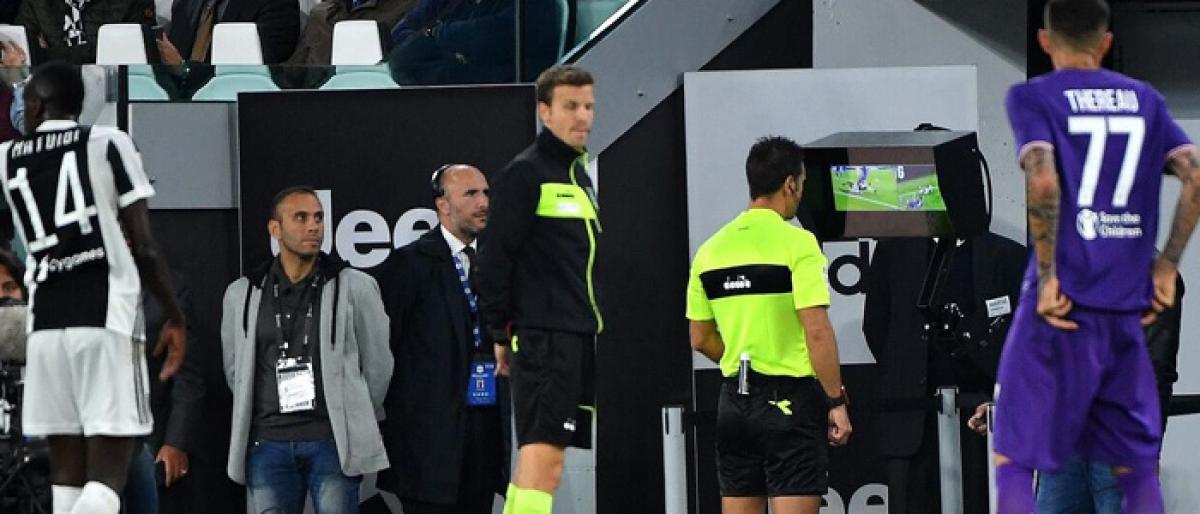Live
- Heavy rains expected in AP due to strengthening low Pressure Area
- Officials told to work in coordination for smooth conduct of Group-2 exams
- Alliance, YSRCP corporators argue over expensive projects
- New CMR mall opens in Kurnool
- Former Speaker Tammineni’s clout on the wane
- Attack on media: Take action against Mohan Babu, demand journalists
- More sports equipment promised at Central Park
- Mohan Babu’s attack on journalists inhumane act
- West Quay-6 of VPA to get revamped
- Rajaiah demands govt to introduce SC categorisation Bill in Assembly
Just In

Given the current debate on video assistant refereeing (VAR), which will be used in this year\'s World Cup matches in Russia, a new study warns that football referees penalise situations more severely when watching them in slow motion compared to real time.
London: Given the current debate on video assistant refereeing (VAR), which will be used in this year's World Cup matches in Russia, a new study warns that football referees penalise situations more severely when watching them in slow motion compared to real time.
The researchers found no significant difference in the accuracy of a referee's decision regarding whether a foul had occurred or not, with slow-motion videos (63 percent accurate) compared to the real-time videos (61per cent accurate).
However, the judgement of intention or force behind a foul differed. More red cards were given by referees watching in slow motion compared to those watching real time video playbacks, showed the findings published in the journal Cognitive Research: Principles and Implications.
"Slow motion video may make it clearer who initiated a foul, whether there actually was contact and whether a foul occurred either inside or outside the penalty area," said one of the study authors Jochim Spitz from University of Leuven (KU Leuven) in Belgium.
"However, judging human emotion, like intentionality is quite another story. It is also the reason why slow motion footage cannot be used anymore in the court room as it increases the perceived intent," Spitz added.
For the study, the researchers studied the response of 88 elite football referees to video clips of a foul warranting a yellow card.
"Our results suggest that slow motion can increase the severity of a judgement of intention, making the difference between perceiving an action as careless (no card), reckless (yellow card) or with excessive force (red card).
"The finding that referees were more likely to make more severe decisions following slow motion replays, is an important consideration for developing guidelines for the implementation of VAR in football leagues worldwide," Spitz added. The authors concluded that although slow motion playback could be a useful tool in assessing some decisions, such as off-side and determining the exact impact of a contact, it may not be the best tool for decisions that involve judging human behaviour and intention.
At a press conference on Saturday, Massimo Busacca, head of FIFA's refereeing department, said the VAR would be important at the World Cup but stressed that the officials on the field would still be tasked with managing the games.
"This is the first time that the impact of slow motion video on decision making has been studied in sports referees and it is timely given the current debate on video assistant refereeing (VAR), which will be used in the World Cup," Spitz added.
During the 2016 FIFA Club World Cup Final in Japan, the first trial of the VAR in an international club competition, Real Madrid manager Zinedine Zidane called the system a source of confusion.
The use of video technology at the 2017 FIFA Confederations Cup was criticised after several contentious moments involving VAR at the tournament. It was accused of "creating as much confusion as clarity".
In a Primeira Liga game between Boavista and Aves in February 2018, an Aves goal that many felt was offside was allowed, after it was discovered that a Boavista supporter's flag had been obscuring the VAR camera. With no VAR evidence available, the referee was required to let the goal stand.[32][33]
In a Bundesliga match between Mainz and Freiburg in April 2018, players were instructed to return to the pitch, having left for half time, after VAR determined that a penalty was due.[34][35]
In the 2018 A-League grand final between Newcastle Jets and Melbourne Victory, VAR failed to overturn a Melbourne Victory goal due to an offside. It was later revealed that the VAR software suffered a technical malfunction which prevented the assistant referee to view the replay. Melbourne went on to win the game 1-0.

© 2024 Hyderabad Media House Limited/The Hans India. All rights reserved. Powered by hocalwire.com







